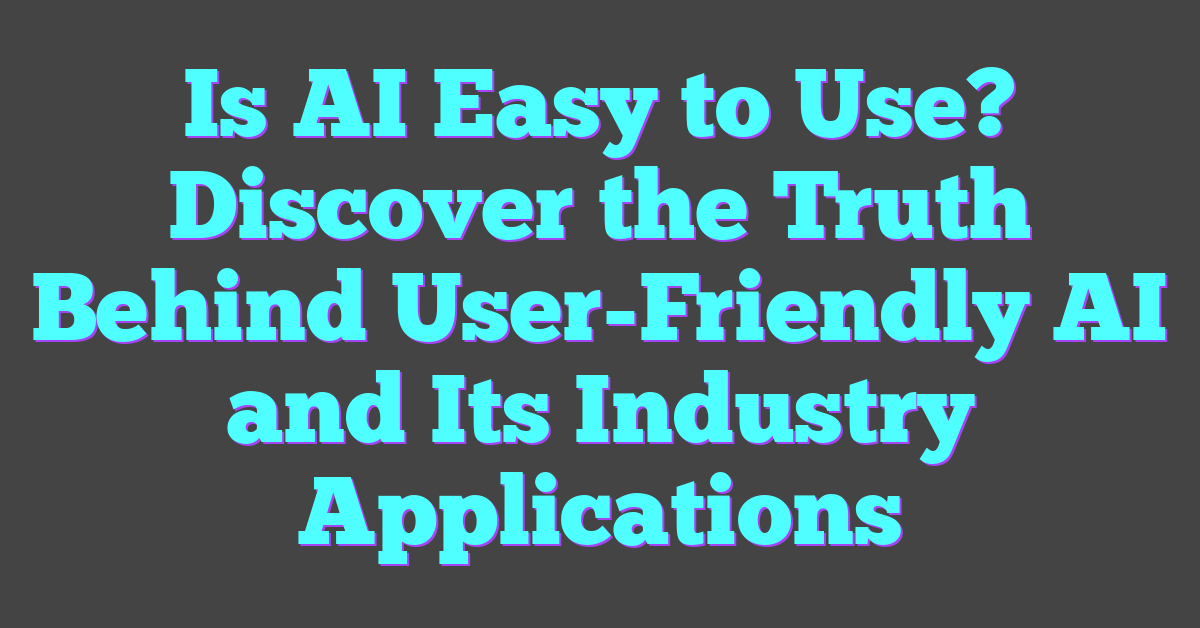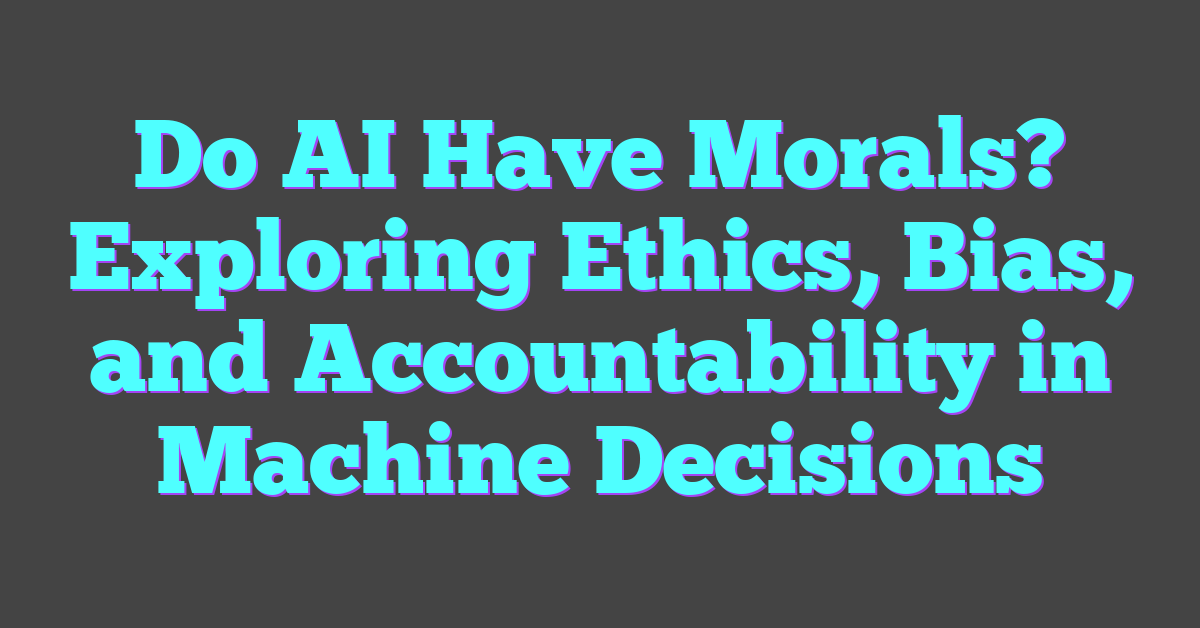Artificial Intelligence (AI) once seemed like something out of a science fiction novel, but today, it’s woven into the fabric of our daily lives. From virtual assistants like Siri and Alexa to recommendation engines on Netflix, AI is everywhere. But with its growing presence, a common question arises: is AI easy to use?
For many, the idea of interacting with AI might feel intimidating, conjuring images of complex algorithms and advanced coding. However, the reality is often much simpler. Modern AI technologies are designed with user-friendliness in mind, aiming to make sophisticated tasks accessible even to those without a tech background. Whether you’re a seasoned developer or a casual user, AI tools are increasingly intuitive and approachable.
Evaluating AI Usability
Understanding AI usability is essential for both everyday users and tech enthusiasts. This section breaks down key aspects of what makes AI user-friendly.

User Interface Design
Effective user interface (UI) design is crucial in AI systems. Well-designed UIs simplify complex functionalities, making AI tools accessible to users with different skill levels. Features such as intuitive dashboards, clear visualizations, and simplified commands enhance user experience. For example, AI-powered photo editing apps offer one-click enhancement options that even beginners can use effectively.
User Experience Feedback
User experience (UX) feedback helps refine AI systems, making them more usable over time. By analyzing user interactions and gathering feedback, developers can identify pain points and improve functionalities. For instance, virtual assistants like Google Assistant continuously evolve based on user feedback, leading to more accurate responses and better user satisfaction. Engaging users in beta testing and incorporating their suggestions also play a significant role in enhancing AI usability.
Key Features That Impact AI Usability
Evaluating AI usability involves exploring several features that influence how easily users can interact with AI systems.
Customization and Flexibility
AI systems are often designed to be customizable. Users can tailor AI models to meet specific requirements. For example, customizable chatbots allow businesses to modify responses and workflows to match their customer service needs. Flexible settings let users adjust parameters, ensuring that the AI functions optimally in various contexts.
Integration With Other Technologies
Seamless integration with other technologies enhances AI usability. AI tools often need to work alongside existing systems like CRMs, ERPs, or IoT devices. For instance, integrating AI-driven analytics with a company’s CRM system can provide deeper insights into customer behavior. These integrations streamline processes, making it easier for users to derive value from AI solutions.
By focusing on these key features, AI technologies become more user-friendly and accessible to a broader audience.
Challenges Faced by Beginners
Beginners often encounter several challenges when starting with AI, despite its increasing accessibility and user-friendly interfaces.
Learning Curve Issues
Understanding AI’s foundational concepts can be daunting for beginners. They need to grasp data science principles, algorithms, and programming languages like Python. Resources such as Coursera and edX offer structured learning paths. Practical exercises in these courses reinforce theoretical knowledge, making complex ideas more approachable.
Common Misconceptions About AI
Beginners frequently harbor misconceptions about AI. Many believe AI systems can function without human intervention, which is not the case. AI requires human oversight for data input, model training, and performance monitoring. Another misconception is that AI can solve any problem instantly; the reality is that data quality and problem complexity significantly affect outcomes. Educative platforms like AI4ALL and tutorials from industry leaders can clarify these points, giving beginners a realistic understanding of AI capabilities.
Advanced Uses of AI
Advanced uses of AI demonstrate its transformative power, extending its reach beyond simple tasks into complex, industry-specific applications.
Innovative AI Applications in Different Industries
Manufacturing, healthcare, and finance sectors have embraced AI to optimize their operations. In manufacturing, AI-driven robots enhance precision and speed on production lines by performing repetitive tasks and complex assembly. Streamlining diagnosis, AI tools in healthcare analyze medical images, predict patient outcomes, and personalize treatment plans. Finance leverages AI for risk assessment, fraud detection, and algorithmic trading, analyzing vast datasets to identify patterns and inform decisions rapidly.
The Role of AI in Big Data Analysis
AI’s power in big data analysis lies in its ability to process massive datasets quickly and accurately. Machine learning algorithms identify trends and anomalies that are too complex for traditional analytical methods. In marketing, AI analyzes consumer behavior to devise personalized marketing strategies. In environmental science, AI parses satellite imagery and climate data to track changes and predict future conditions. Through these applications, AI transforms vast amounts of raw data into actionable insights, enhancing decision-making across sectors.
Conclusion
AI’s integration into our daily lives is undeniable and growing rapidly. While it might seem daunting at first, especially with the technical aspects, the benefits and potential it offers make it worth exploring. From healthcare to finance and manufacturing, AI is revolutionizing how industries operate and make decisions. With the right resources and a bit of patience, anyone can start leveraging AI’s power. So, don’t be afraid to dive in and see how AI can make a difference in your world.
Frequently Asked Questions
What is artificial intelligence (AI)?
AI refers to the simulation of human intelligence in machines programmed to think and learn. It includes technologies like machine learning, neural networks, and natural language processing.
How is AI integrated into daily life?
AI is present in various forms, such as virtual assistants like Siri and Alexa, recommendation systems on Netflix and Amazon, and smart home devices that automate everyday tasks.
Do I need to know data science to understand AI?
While understanding data science principles and programming languages is helpful, many AI tools are user-friendly and do not require extensive technical knowledge.
What are common misconceptions about AI?
Common misconceptions include the belief that AI will replace all human jobs and that AI systems inherently understand context and emotions. In reality, AI is designed to augment human capabilities and requires large datasets to operate effectively.
How is AI transforming the manufacturing industry?
AI-driven robots and automation tools optimize manufacturing processes by improving precision, efficiency, and safety. They analyze vast amounts of data to predict maintenance needs and reduce downtime.
How does AI benefit the healthcare sector?
AI tools assist in diagnosis, personalized treatment plans, and predictive analytics, improving patient outcomes. They analyze medical data to identify patterns and suggest actionable insights for healthcare professionals.
What role does AI play in the finance industry?
AI applications in finance include risk assessment, fraud detection, and personalized financial advice. AI systems analyze large datasets to identify anomalies and predict potential risks, enhancing decision-making processes.
Are there resources for structured AI learning?
Yes, there are many online courses, tutorials, and certification programs from platforms like Coursera, edX, and Udacity that offer structured learning paths for both beginners and advanced learners.
Is AI capable of independent thought?
No, AI lacks consciousness and cannot think independently. It operates based on algorithms and data, performing tasks it is specifically programmed to execute.
What industries are most impacted by AI?
Industries such as manufacturing, healthcare, finance, retail, and logistics are heavily impacted by AI, as it optimizes operations, enhances decision-making, and provides deeper insights through data analysis.




